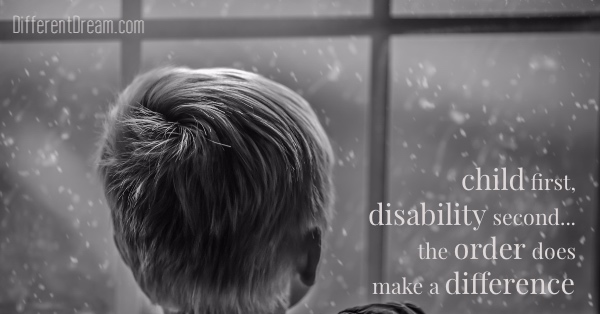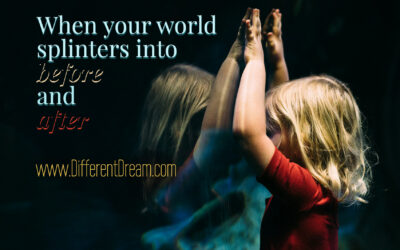Child First, Disability Second

Child first, disability second. Guest blogger Mark Arnold explains how the order of those words can and should shift our perception of people living with disabilities and special needs. Once you read his words, you may want to share his wisdom to get the perception shift ball rolling.
Often, when someone asks me for help regarding a child with additional needs or disabilities, their starting point is problem solving centered on the child’s condition. It’s easy to see how this narrative forms. It comes from a place of getting a child that doesn’t fit our model of a typical child to adapt. The main thing that’s preventing it is their disability.
Surely there is a better way of looking at this. A starting point that isn’t problem-centered but child-centered looks first at a fabulous, individual, gifted child of God and build a more positive narrative about how we can adapt to meet the child’s needs. In other words, put the child first, disability second.
For example, our son, James is loving and affectionate, has an infectious belly laugh, loves Minions, the color yellow, PlayDoh, and trips to the farm shop or café. He is a good looking lad (I know, I’m biased!) who is loved by everyone who meets him. He is also autistic and has learning difficulties and epilepsy, so he needs adaptations to access things and be included.
A tool I regularly recommend to support children like James is a one page profile, a resource to help anyone working with children or young people get to know them better. The profile asks three key questions of the person being profiled. The order and priority given them (child first, disability second) is important.
1. What do people like and admire about me?
This sets the right tone from the outset and creates a positive narrative about the child or young person, a child-centered narrative rather than a problem-centered one. By identifying and listing the positive attributes of the child we see him more full. We see the positive things about the child that are fulfilling. This focus is affirming and constructive, completely changing the way we think about the child and respond.
2. What makes me happy?
If we know what makes a child or young person happy then we can get to know him better through those things. We see him more broadly as an animal lover, as someone who likes to play with and explore through the sense of touch, or as someone who like technology. We can also use those things to engage the child and keep him interested and focused.
3. How I want to be supported.
The words used in this final section are deliberate and helpful. First, it is a person-centered statement. Second, it talks about what support needs to look like, putting the emphasis on us to provide that support, for us to adapt rather than the child. That’s the right way around!
Resources like this can help change the narrative for children and young people with disabilities and special needs. (You can download one page profiles at www.sheffkids.co.uk. Go to the Adults section and choose Resources.) These resources help us understand people as individuals, not labels. They also can change perceptions about children and young people with additional needs or disabilities from being seen as problems to solve to being people to serve.
When we see each child as a child first, disability second, we see them as God does.
The Lord does not look at the things people look at. People look at the outside of a person. But the Lord looks at what is in the heart.
1 Samuel 16:7b (NIRV)
Do you like what you see at DifferentDream.com? You can receive more great content by subscribing to the monthly Different Dream newsletter and signing up for the daily RSS feed delivered to your email inbox. You can sign up for the first in the pop up box and the second at the bottom of this page.
By Mark Arnold
Mark Arnold is the Additional Needs Ministry Director at Urban Saints, a leading national Christian children’s and youth organization. He is co-founder of the Additional Needs Alliance, a national and international advocate for children and young people with additional needs or disabilities. Mark is a Churches for All and Living Fully Network partner, a member of the Council for Disabled Children and the European Disability Network. He writes an additional needs column for Premier Youth and Children’s Work (YCW) magazine and blogs at The Additional Needs Blogfather, He is father to James, who has autism spectrum condition, associated learning disability, and epilepsy. To find out more about how Mark’s work can help you, contact him at: marnold@urbansaints.org or @Mark_J_Arnold.
Subscribe for Updates from Jolene
Related Posts
The Weight of Silence as Parents of Kids with Invisible Disabilities
Guest blogger Lisa Pelissier explains the weight of silence as parents of kids with invisible disabilities.
How to Build a Thriving Marriage as You Care for Children with Special Needs
Todd and Kristin Evans explain how to build a thriving marriage as you care for children with special needs.
Choosing Acceptance and Advocacy as Parents of Kids with Disabilities
Choosing acceptance and advocacy as parents of kids with disabilities can be hard, but it’s necessary to our kids and to ourselves.






0 Comments